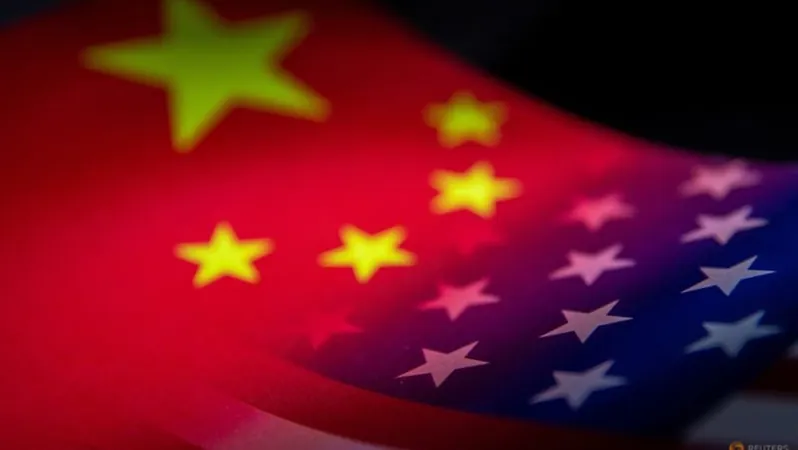
The United States Regains Favor in Southeast Asia Amid Rising Tensions with China
2025-04-03
Author: Wei Ling
Survey Findings on US vs China Preference
In a recent survey conducted across 11 Southeast Asian nations, it was revealed that a majority of the population would prefer the United States over China if compelled to choose sides in their growing rivalry. The findings from the ISEAS-Yusof Ishak Institute's annual report titled State of Southeast Asia 2025, released earlier this month, indicate that 52.3% of respondents view the US as a more favorable partner compared to 47.7% who favor China.
Geopolitical Dynamics
The survey, involving 2,023 participants and conducted from January 3 to February 15, 2025, shines a spotlight on the complex dynamics of geopolitical competition in the region. Notably, it was the first time participants from Timor-Leste were included, highlighting the importance of this newly aspiring ASEAN member.
ASEAN's Balancing Act
This year's report underscores a significant political shift, as more than half of the respondents believe that the Association of Southeast Asian Nations (ASEAN) must strengthen its unity and resilience to handle the pressures exerted by both superpowers. "This narrow margin highlights ASEAN’s delicate balancing act, caught between an economically interdependent relationship with China and long-standing historical ties with the US," the report elaborates.
Regional Support for the US
Support for the US was particularly robust in Vietnam and the Philippines, likely due to ongoing territorial disputes with China in the South China Sea and enhancing security partnerships with the US. Rising tensions in maritime regions have emerged as the top geopolitical concern for Southeast Asia, overshadowing issues like organized crime and changes in US leadership.
China's Continued Influence
Interestingly, while the US regained its position as the preferred ally, China retains its status as the most influential economic and political power in the region. The ISEAS report noted, "Despite Washington's lead in preferences, China still dominates in terms of economic sway, driven by significant trade ties and ongoing Belt and Road Initiative investments."
Concerns from Indonesia
Respondents from Indonesia presented the strongest support for China, fueled by deep-seated economic relationships and a growing discontent with US policies. Concerns regarding the unpredictability of leadership under President Donald Trump were evident, with many respondents expressing apprehension about his approach to US engagement in Southeast Asia.
Wariness Towards China
The shift in perception is noteworthy, especially considering that nearly 70% of those surveyed indicated some degree of wariness regarding China's expanding influence in the region. Respondents from Thailand, Vietnam, and the Philippines exhibited the highest levels of concern, while Cambodia, Brunei, and Malaysia appeared more receptive to China's economic presence.
Xi Jinping's Upcoming Visit
Amidst this geopolitical tug-of-war, Chinese President Xi Jinping is scheduled to visit several Southeast Asian countries, including Vietnam and Malaysia, in mid-April. This visit marks Xi’s first to the region since his last trip in 2023 and is poised to further complicate the already tense US-China relations.
Perception of Trust in Superpowers
Moreover, when asked about trust in superpowers, Japan emerged as the most trusted nation, surpassing the US, EU, China, and India. The perception of Japan as a "responsible stakeholder" reinforces its soft power in the region, particularly in countries like Singapore and Vietnam.
Optimism about US Relations
Overall, optimism about relations with the US remains prevalent, especially in Vietnam and Laos, with nearly half of the respondents anticipating a strengthening of ties, despite Trump's administration. Interestingly, in Timor-Leste, almost 70% expressed expectations for improved relations with China, signaling a growing recognition of China as a pivotal development partner in Southeast Asia.
Conclusion: Navigating US-China Rivalry
As Southeast Asia navigates through the choppy waters of US-China rivalry, the insights from the ISEAS report reveal a desire among ASEAN member states for greater autonomy and resilience, emphasizing the critical role this vibrant region plays on the global stage—further solidifying its importance as both the US and China vie for influence.




 Brasil (PT)
Brasil (PT)
 Canada (EN)
Canada (EN)
 Chile (ES)
Chile (ES)
 Česko (CS)
Česko (CS)
 대한민국 (KO)
대한민국 (KO)
 España (ES)
España (ES)
 France (FR)
France (FR)
 Hong Kong (EN)
Hong Kong (EN)
 Italia (IT)
Italia (IT)
 日本 (JA)
日本 (JA)
 Magyarország (HU)
Magyarország (HU)
 Norge (NO)
Norge (NO)
 Polska (PL)
Polska (PL)
 Schweiz (DE)
Schweiz (DE)
 Singapore (EN)
Singapore (EN)
 Sverige (SV)
Sverige (SV)
 Suomi (FI)
Suomi (FI)
 Türkiye (TR)
Türkiye (TR)
 الإمارات العربية المتحدة (AR)
الإمارات العربية المتحدة (AR)